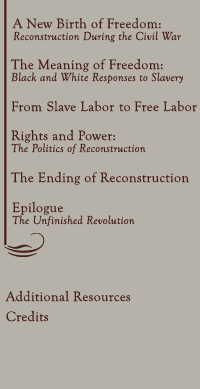




Reconstruction Government in the South
Under the terms of the Reconstruction Act of 1867, Republican governments came to power throughout the South, offering blacks, for the first time in American history, a genuine share of political power. These governments established the region's first public school systems, enacted civil rights laws, and sought to promote the region's economic development.
The coming of black suffrage under the Reconstruction Act of 1867 produced a wave of political mobilization among African Americans in the South.
In Union Leagues and impromptu gatherings, blacks organized to demand equality before the law and economic opportunity.
Blacks were joined by white newcomers from the North - called "carpetbaggers" by their political opponents. And the Republican party in some states attracted a considerable number of white Southerners, to whom Democrats applied the name "scalawag" - mostly Unionist small farmers but including some prominent plantation owners.
By 1870, the former Confederate states had been readmitted to the Union under new constitutions that marked a striking departure in Southern government. For the first time in the region's history, state-funded public school systems were established, as well as orphan asylums and other facilities.
The new governments passed the region's first civil rights laws, reformed the South's antiquated tax system, and embarked on ambitious and expensive programs of economic development, hoping that railroad and factory development would produce a prosperity shared by both races.
Composed of slave ministers, artisans, and Civil War veterans, and blacks who had been free before the Civil War, a black political leadership emerged that pressed aggressively for an end to the South's racial caste system.
African Americans served in virtually every governmental capacity during Reconstruction, from member of Congress to state and local officials. Their presence in positions of political power symbolized the political revolution wrought by Reconstruction.
Copyright
2003